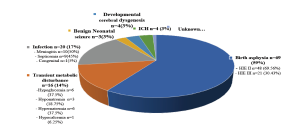Etiological Profile of Neonatal Seizures and Prognostic Factors for Adverse Outcome: A Single Center Prospective Study
Keywords:
APGAR score, developmental delay, hypoxic ischemic encephalopathy, neonatal seizureAbstract
Introduction: Neonatal seizure is the most common manifestation and an important determinant of outcome of neurological disorders in newborn period. This study aims to delineate the etiological profile and neurodevelopmental outcome of neonatal seizures and also to identify predictors for adverse outcome.
Methods: One hundred and seventeen neonates with clinically proven seizures admitted in Dhulikhel Hospital from February 2014 to February 2016 were recruited. All of them underwent necessary neurological diagnostic tests. The survivors were followed up for at least three times within the first 18 months of life. Prognostic value of factors for adverse outcomes were analyzed with Chi square test and binary logistic regression analysis.
Results: Among a total of 954 neonates admitted, 117 (12.26%) developed clinical seizures. The most common cause of neonatal seizure was hypoxic ischemic encephalopathy (n=69, 59%), followed by infection (n=20, 17.09%), and metabolic disturbances (n=16, 13.7%). The outcomes were mortality (n=16, 13.7%), post neonatal seizure (n=18, 15.4%), developmental delay (n=31, 26.5%), vision impairment (n=19, 16.2%) and hearing impairment (n=26, 22.2%). Low Apgar scores at one minute (p=0.03) and five minutes (p=0.001), early onset seizure (p<0.001), and more than one drug used for seizure control (p=0.001) were early prognostic factors for adverse outcome.
Conclusion: Birth asphyxia followed by infection and transient metabolic disturbance were common etiologies for neonatal seizures. Low Apgar scores at one and five minutes, early onset seizure, multiple episodes of seizures and requirement of multiple anti-epileptics to control seizures were found to be significant predictors for adverse neurodevelopmental outcome.
Downloads

Downloads
Published
How to Cite
Issue
Section
License
The Journal of Lumbini Medical College (JLMC) publishes open access articles under the terms of the Creative Commons Attribution(CC BY) License which permits use, distribution and reproduction in any medium, provided the original work is properly cited.JLMC requires an exclusive licence allowing to publish the article in print and online.
The corresponding author should read and agree to the following statement before submission of the manuscript for publication,
License agreement
In submitting an article to Journal of Lumbini Medical College (JLMC) I certify that:
- I am authorized by my co-authors to enter into these arrangements.
- I warrant, on behalf of myself and my co-authors, that:
- the article is original, has not been formally published in any other peer-reviewed journal, is not under consideration by any other journal and does not infringe any existing copyright or any other third party rights;
- I am/we are the sole author(s) of the article and have full authority to enter into this agreement and in granting rights to JLMC are not in breach of any other obligation;
- the article contains nothing that is unlawful, libellous, or which would, if published, constitute a breach of contract or of confidence or of commitment given to secrecy;
- I/we have taken due care to ensure the integrity of the article. To my/our - and currently accepted scientific - knowledge all statements contained in it purporting to be facts are true and any formula or instruction contained in the article will not, if followed accurately, cause any injury, illness or damage to the user.
- I, and all co-authors, agree that the article, if editorially accepted for publication, shall be licensed under the Creative Commons Attribution License 4.0. If the law requires that the article be published in the public domain, I/we will notify JLMC at the time of submission, and in such cases the article shall be released under the Creative Commons 1.0 Public Domain Dedication waiver. For the avoidance of doubt it is stated that sections 1 and 2 of this license agreement shall apply and prevail regardless of whether the article is published under Creative Commons Attribution License 4.0 or the Creative Commons 1.0 Public Domain Dedication waiver.
- I, and all co-authors, agree that, if the article is editorially accepted for publication in JLMC, data included in the article shall be made available under the Creative Commons 1.0 Public Domain Dedication waiver, unless otherwise stated. For the avoidance of doubt it is stated that sections 1, 2, and 3 of this license agreement shall apply and prevail.
Please visit Creative Commons web page for details of the terms.



